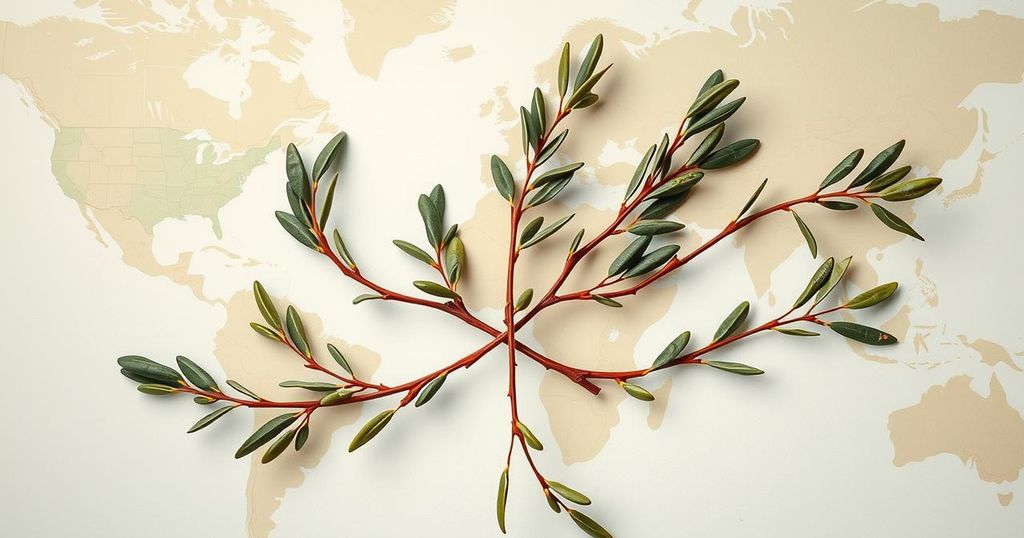The Gaza conflict has paradoxically strengthened Morocco’s ties with Israel, marked by significant military agreements. Morocco seeks to bolster its defense capabilities with Israeli technology, despite public opposition to normalization with Israel. This relationship is further influenced by geopolitical factors, particularly regarding Western Sahara and military cooperation against common adversaries.
Recent developments have indicated that the conflict in Gaza has not lessened Morocco’s relations with Israel. Conversely, Morocco has intensified its collaboration with Israel, as evidenced by the recent acquisition of 36 Atmos 2000 artillery systems from Israeli manufacturer Elbit Systems. This strategic shift marks a departure from Morocco’s traditional military suppliers, such as France, signaling a broader trend in defense cooperation with Israel.
In addition to artillery, Morocco has contracted Israeli Aerospace Industries (IAI) to upgrade its surveillance satellites. This $1 billion deal will provide Morocco with two Ofek-13s over four years, representing one of the most significant defense contracts between Israel and Morocco to date. Furthermore, Morocco’s selection of Israeli systems, including Heron drones and missile defense technology, underscores a growing military partnership.
Historically, Morocco has maintained a discreet relationship with Israel, dating back to secret meetings in the 1980s. The formal resumption of diplomatic ties between the two nations came in December 2020 when Morocco joined the Abraham Accords. This normalization process, which included US recognition of Morocco’s sovereignty over Western Sahara, lays the foundation for ongoing military and economic partnership.
Despite increasing ties with Israel, Morocco faces significant domestic opposition to its relationship with Israel. Pro-Palestinian demonstrations organized by the Moroccan Front for the Support of Palestine have drawn large crowds, revealing public discontent. A recent poll indicated that support for normalization with Israel has plummeted from 31% to 13% post-war, showcasing the growing divide between government actions and public sentiment.
Though protests are tolerated, repression against strong opponents is relatively mild, with notable cases like activist Ismail Lghazaoui, who was sentenced for inciting protests against Israeli interests. The Moroccan monarchy has largely benefited from Israel’s support, especially regarding humanitarian aid deliveries to Gaza, which are presented favorably in Moroccan media and help mitigate public backlash.
Factors driving Morocco’s continued ties with Israel include military cooperation against common adversaries, particularly Algeria’s support for the Polisario Front in Western Sahara. Morocco’s relations with Israel are seen as vital for bolstering military capabilities as well as securing US support for its claims over Western Sahara.
Furthermore, Morocco hopes to gain diplomatic recognition of its position in Western Sahara through its alliance with the US, especially after Trump’s earlier recognition in 2020. Moroccan officials express aspirations for a definitive endorsement of their territorial claims during upcoming diplomatic discussions involving the UAE and the US.
As the situation evolves, observers anticipate that Morocco’s role in future peace efforts in Gaza may become more pronounced. The Biden administration has hinted at the possibility of an Arab peacekeeping mission, which could position Morocco as a significant contributor in post-conflict scenarios, further entrenching its strategic partnership with Israel.
In summary, Morocco’s alliance with Israel has strengthened despite public opposition regarding the Gaza conflict. The nation continues to deepen military ties through significant defense agreements, while also navigating domestic pressures for pro-Palestinian advocacy. As diplomatic dynamics evolve, Morocco’s relationship with both Israel and the US is crucial for its national interests, particularly regarding Western Sahara and regional security.
Original Source: www.middleeasteye.net






